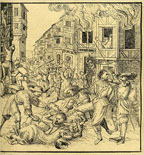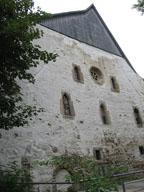

The origins of the Jewish community in Erfurt date back to the late 11th century, as indicated by the first building phase of the Old Synagogue. Two extraordinary items from the late 12th century have survived to bear witness to this: the "Erfurt Jewish Oath" and a bronze Sabbath lamp in the treasure of the Erfurt Cathedral.
It is only in the 13th century that the evidence becomes more extensive. Tax lists and documents tell us that Erfurt Jews were active in banking, and not only did business regionally with cities and noblemen, but also has business connections throughout the Empire. The Jewish quarter was right in the town centre, in the area between the Town Hall, the Krmer Bridge and St Michael's Church. They lived right next to Christian merchants here, and this is where their prestigious synagogue was located. There was a Mikwe close by, and the cemetery was located outside the residential area, by the Moritz Gate.
Important academics, including the Rabbi and author Alexander Ssskind ha-Kohen, lived and taught in Erfurt. The highly developed intellectual life enjoyed by the community is proved by 15 Hebrew manuscripts in the Berlin State Library.
A pogrom was started in 1349: The Jews in Erfurt were attacked on the pretext that they had poisoned the wells. The entire community was killed during the riots and the quarter was burnt down. The Old Synagogue was profaned.
Just a short time later, probably from 1354, Jews came to settle again in Erfurt. The Erfurt City Council had a new synagogue built behind the City Hall between 1355 and 1357 for the revived community. The Jews largely lived in the same quarter, but mostly renting municipal "Jewish houses". There were also some well-to-do, influential families operating as wholesalers in the second community, but many Jews were also pawnbrokers and dealers in second-hand clothing.
Anti-Semitism increased in Erfurt in the 15th century. In 1453, the City Council withdrew its protection of the Jews, and all Jews left the City of Erfurt at these times. No Jews were allowed to stay in Erfurt from 1458 onwards. Jewish homes were sold, the synagogue converted into an arsenal and the cemetery destroyed.